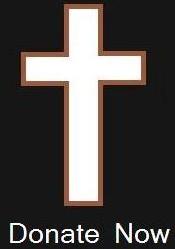Overturning Tables
There is a picture of a bearded and hairy legged man all dressed up in a cheerleader’s costume with pompoms in hand waiting with others for the arrival of Jesus’ entry into Jerusalem. As he looks around, he notices all others with palm branches and says, “I heard Jack the Stutterer say that this was pompom Sunday.
Often, the church makes light of Palm Sunday. A nice parade with palm fronds, children, and glorious hallelujahs. Forgotten is that Palm Sunday is a prequel Good Friday. The day is bursting with tension, stress, and high anxiety. Religious and political authorities fear Jesus and the crowd he has attracted.
The masses were excited to see Jesus. Tales of his feats had spread far and wide. People were curious, hopeful, and expectant that this would be the time when the Messiah would act perhaps as a vigilante to free the people. Or at the very least, Jesus might do a few other miracles along the path after all he had raised Lazarus from the dead! Some perhaps were thinking, “May be Jesus can heal me!” The frenzied crowd threatened the authorities. Tensions were high.
According to the gospels of Matthew, Mark, and Luke Jesus enters Jerusalem and then enters the Temple. Once in the Temple, Jesus, in an angry rage, overturns the tables of money changers and runs them out of the Temple. Tensions were higher.
The narrative from Amos 8:16-24 provides a clue to our understanding. Amos had spoken to Israel about all the sins of her neighbours and how horrible they all are. What a great way to get your audience on side, and then Amos lowers the boom on Israel.
Amos challenges the people for their extravagant luxury and vain piety at a peak time of Israel’s economic and political power. The people had come to trust in militaristic power, participate in grave injustices as described by Amos – “You turn justice into wormwood, and bring righteousness to the ground.” There was abhorrent immorality such as “trampling the poor” and “abhorring the one who speaks truth.” Amos had harsh words for a smooth season.
In our season of abundance and luxury, do these words not fit our day and time? Can we hear the call from Amos to “let justice roll down like waters, and righteousness like an ever-flowing stream?”
Like the people of Amos’ day we trust in military might, participate in grave injustice, and join in shallow meaningless worship.
And here we are worshipping! Worship is more than the best sermon ever! Worship is more than the best anthem ever! Worship is more than meeting up with one’s best friends! Worship is more than the noise of our solemn assemblies! Ouch!! This stings!
Jesus entered the Temple after arriving in Jerusalem. When he overturned the tables of the money changers, it was more than an act of protest. It was a revolution.
The story takes us back to Caesarea Philippi. It was there that Jesus asked his disciples, “who do you say that I am?” The answer was, “You are the Christ, the Anointed One of God.” The Anointed one’s had to go to Jerusalem and the Temple. There, they would make changes and to put it in our vernacular, keep their campaign promises. Wrongs would be righted! Truth restored! The people freed! Taxes reduced! The swamp will be drained!
As an aside, I love swamps! I grew up in the swamps. They are beautiful and teeming and swarming with life. The swamps I grew up appreciating had descriptive names like the Great Dismal Swamp, and my favorite – the Creep Crawly Swamp! Metaphors only go so far, but we get the draining of the swamp.
Jesus, however, knew that the problem couldn’t be fixed by simply doing the same ol’ thing – draining the swamp and filling it with even creepier people and practices. The Temple simply couldn’t be drained. Jesus’ revolution was far-reaching. It recognized that the Temple is gathered around him – his teaching, his healing, his loving, and his bringing to all the wondrous grace of God. “At heart he was remaking the people of God around himself, and telling everyone that they were freely welcome.” Jesus was offering people the sort of blessing you could only get (buy) in the temple. He was offering forgiveness, righteousness, and justice. He was building an egalitarian community of “saints and sinners.” The Temple was outdated!
Jesus, and not only in the Temple, but more in life, was overturning tables and barriers that kept others on the outside. Tables that keep people hungry and needy. Tables that kept people separated by sex and wealth and class and clan. This is revolutionary! One can by-pass the money changers, the solemn assembles, and costly sacrifices that only the wealthy could afford.
What tables need to be overturned today? In society? In our religions? In our spiritualties? What keeps us from forgiveness, love, community, and peace? St. Paul says that we, our hearts, are also the temple of God. Perhaps, here we look first. Rich Villodas said, “If the gospel we profess doesn’t call into question our political captivity, flippant sexuality, insatiable militarism, pervasive racism, unfettered materialism, and the like, it’s not the gospel we are professing.”
What tables in our hearts need to be overturned so that we experience grace, abundant life, and true community?
Overturning tables is revolutionary! But more so, is the act of setting up tables were all are welcome and can come and eat and embrace life and find community and peace.
One huge and sadly continuing barrier is white privilege and white supremacy. Valerie Kaur, a Sikh feminist and activist, said, “White supremacy is as old as America. But so are acts of Revolutionary Love – and every act of love inspires another.”
There are many barriers – tables to be overturned, but we are part of an ongoing revolution– Love. Loving beyond the confines of race, religion, fear, prejudice, and stereotypes.
We are flipping tables! We are setting up tables! We are the change! The vault of our Temple is the sky! The floor of our Temple in the earth! The people of our Temple are one!

